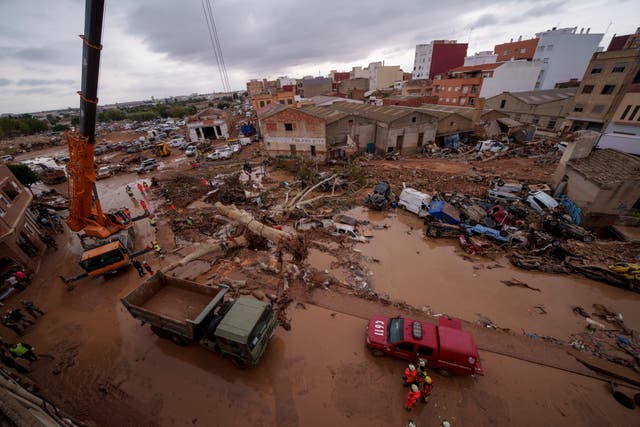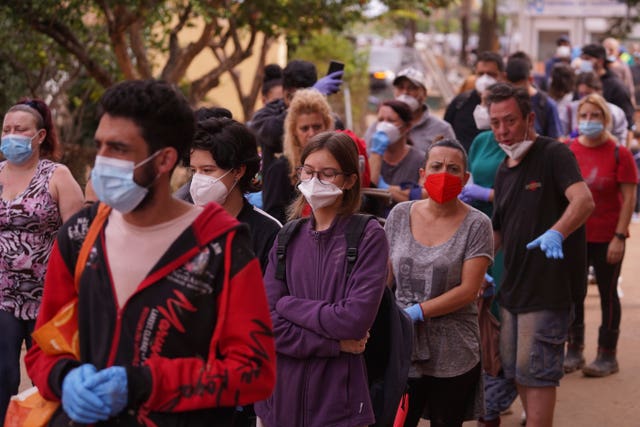Storms in eastern Spain that led to massive flooding last week and killed more than 200 people, mostly near Valencia, have now dumped rain on Barcelona, prompting authorities to suspend commuter rail services.
Spanish Transport Minister Oscar Puente said he was suspending all commuter trains in north-east Catalonia, a region with a population of eight million, on request from civil protection officials.
Mobile phones in Barcelona issued an alert over “extreme and continued rainfall” on the southern outskirts of the city. The alert urged people to avoid any normally dry gorges or canals.

Mr Puente said that the rains had forced air traffic controllers to change the course of 15 flights operating at Barcelona’s airport, located on the southern flank of the city.
Several major roads have been closed due to flooding.
Classes were cancelled in Tarragona, a city in southern Catalonia about halfway between Barcelona and Valencia, after a red alert for rains was issued.
Meanwhile, in Valencia, the search continued for bodies inside houses and thousands of wrecked cars strewn in the streets, on major roads, and in canals that channelled last week’s deluge into populated areas.
Citizens, volunteers and thousands of soldiers and police officers are helping in the gargantuan clean-up effort of mud and debris.

Spain’s Interior Minister Fernando Grande-Marlaska said authorities are still unable to give a reliable estimate of the amount of people who are missing.
Spanish national television RTVE, however, has broadcast pleas for help by several desperate people whose loved ones are unaccounted for.
In the Aldaia municipality, some 50 soldiers, police and firefighters, some wearing wetsuits, searched in a huge shopping centre’s underground car park for possible victims. They used a small boat and spotlights to move around in the huge structure with vehicles submerged in at least 3ft of murky water.
Police spokesman Ricardo Gutierrez told reporters that so far some 50 vehicles had been found and no bodies had been discovered there.
The Bonaire shopping mall’s 1,800 underground parking spaces quickly filled with water and mud on Tuesday and Wednesday when the southern outskirts of Valencia were hit by a tsunami-like flooding event. The team is using four pumps to remove the water.

Citizens, volunteers and thousands of soldiers and police officers pressed on with their gargantuan clean-up effort to clear out mud and debris.
Many people feel abandoned by authorities, with their anger erupting on Sunday when a crowd tossed mud at Spain’s royal couple, the Prime Minister and regional leaders as they made their first visit to Paiporta, where more than 60 people died and the survivors lost their homes and still do not have drinking water.
Spain is used to autumn storms that can lead to flooding, but the latest ones have produced the deadliest floods in living memory for Spaniards.
Climate scientists and meteorologists say the immediate cause of the flooding was a cut-off lower-pressure storm system that migrated from an unusually wavy and stalled jet stream. It was likely fuelled by a record-hot Mediterranean Sea. That system simply parked itself over the region and unleashed a deluge.
The Spanish navy’s Galicia transport vessel arrived in Valencia’s port on Monday with marines, helicopters and trucks loaded with food and water to help with the relief effort, which included 7,500 soldiers and thousands of police reinforcements.




Why are you making commenting on The Herald only available to subscribers?
It should have been a safe space for informed debate, somewhere for readers to discuss issues around the biggest stories of the day, but all too often the below the line comments on most websites have become bogged down by off-topic discussions and abuse.
heraldscotland.com is tackling this problem by allowing only subscribers to comment.
We are doing this to improve the experience for our loyal readers and we believe it will reduce the ability of trolls and troublemakers, who occasionally find their way onto our site, to abuse our journalists and readers. We also hope it will help the comments section fulfil its promise as a part of Scotland's conversation with itself.
We are lucky at The Herald. We are read by an informed, educated readership who can add their knowledge and insights to our stories.
That is invaluable.
We are making the subscriber-only change to support our valued readers, who tell us they don't want the site cluttered up with irrelevant comments, untruths and abuse.
In the past, the journalist’s job was to collect and distribute information to the audience. Technology means that readers can shape a discussion. We look forward to hearing from you on heraldscotland.com
Comments & Moderation
Readers’ comments: You are personally liable for the content of any comments you upload to this website, so please act responsibly. We do not pre-moderate or monitor readers’ comments appearing on our websites, but we do post-moderate in response to complaints we receive or otherwise when a potential problem comes to our attention. You can make a complaint by using the ‘report this post’ link . We may then apply our discretion under the user terms to amend or delete comments.
Post moderation is undertaken full-time 9am-6pm on weekdays, and on a part-time basis outwith those hours.
Read the rules here